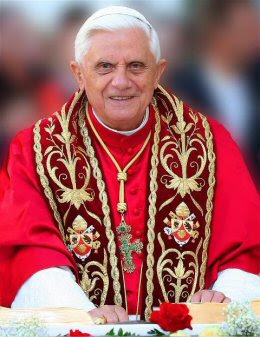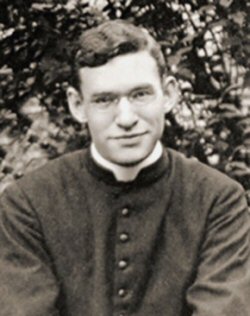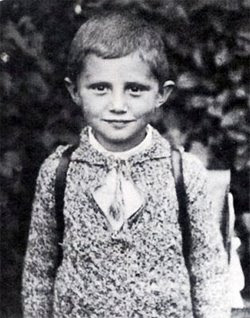From the Sioux City Catholic Globe
By Kara Koczur
It doesn’t take much to write an e-mail. Quickly type a few words, add a period, then click, it’s gone. Text messaging is much the same, perhaps easier. Just scramble a few letters and hit “send.”
But writing a letter takes time and deliberation. The right words must be thoughtfully chosen. One mistake, one false move with the pen could mean having to start fresh.
Yet when it comes to the diocese’s letter writing to seminarians program, held during Vocations Awareness Week for diocesan youth, Father Brad Pelzel, diocesan vocations director, isn’t concerned about perfectly dotted “i’s” or crossed “t’s.” In the second year of the program, which replaced the poster contest, he is more concerned that the letters get students thinking about what God may be calling them to.
“For the students, it was a new way of getting them to think about vocations and it personally connected and invested them with the vocation of whichever seminarian that they wrote to,” he said. “Between the newness of the approach and the personal contact, it really energized the classes that participated in the program and the benefits and excitement extended long after Vocations Awareness Week ended.”
Students become energized when a seminarian writes back, which happened last year for a religious education class at St. Joseph’s in Milford. The interaction with the seminarian was fun for the kids, said Karen Schwaller, director of religious education for the parish.
It also allowed the students to “rub elbows” with young men actively discerning their vocations.
“Having them write is a rare opportunity for them to make contact with someone considering the priesthood,” said Schwaller, who gave all her religious education classes the opportunity to participate, though some chose not to. “It’s a chance to get them thinking about ‘What if I want to do that someday?’”
While the program is only in its second year, Candi Streit, a teacher at St. Edmond Elementary School in Fort Dodge, is an expert at having her classes write to seminarians. She started back when Fathers William Vit and Anthony Vinson, OSB, were in seminary and has continued it for about eight years. Most recently her classes had “adopted” and written to Father Jeremy Wind until his ordination this past summer.
“Writing to the seminarians is something that makes the connection between the students and vocations a little more concrete,” said Streit, who teaches second grade. “There is someone that they ‘know’ who is studying for the priesthood.”
In the past, seminarians her classes wrote to have personally visited her classroom and thanked the students for their letters and prayers. She added that when Fathers Vit and Vinson were ordained, some of her students attended their first Masses in Fort Dodge.
“When the students have a special bond with a seminarian, we are helping each other out through our prayers especially,” Streit said, adding that all of St. Edmond Elementary writes letters during Vocation Awareness Week. “Through the exchange of letters and pictures, we establish a friendship based on faith.”
One of the seminarians Streit’s class wrote to last year was Aaron Pohlen of Hospers. Pohlen, a junior at St. John Vianney College Seminary in St. Paul, Minn., said the letters he receives from Vocations Awareness Week piles up between three to four inches high. The letters are filled with questions ranging from what he does in college, if he likes it, what is he studying and how he heard God’s call.
“It is great for me to receive the letters, to hear from the kids in the diocese, to hear their words of encouragement,” he said. “I am in the Twin Cities, yet I have interaction with the people of the diocese. …It’s important for us to hear from people at home.”
Father Pelzel acknowledged that the benefits of the program are two-fold.
“For the students it establishes personal connections and extends excitement over religious vocations,” he said. “For our seminarians it helps them by reminding them in a tangible way of all the love and prayers our people are offering up on their behalf.”
The connections the letters create are important. In a diocese that’s so spread out, Pohlen noted, it can be difficult for students to have interaction with seminarians, or even know they exist, as was the case for some of Jenny Molmann’s students. The director of faith formation at Holy Cross School in Sioux City, Mohlmann is having half of her students in grades 6-8 write to seminarians.
“Some students in grades 6-8 were not aware of what a seminarian was and the preparation it takes to become a priest, or how many seminarians there were from our diocese,” she said.
Mohlmann encouraged her students to ask the seminarians questions in their letters, such as how they decided they were being called, what seminary they are attending, what a typical day is like and how old they were when they decided to go to seminary. Students also wrote information about themselves.
“I believe as Catholic students, it is good for them to show their support for our seminarians, take time to communicate with them, and pray for them,” she said, adding that Holy Cross also participated in the program last year.
While Mohlmann isn’t expecting individual letters back for all the students, she hopes that she’ll receive a general letter for the class, answering the students’ questions. In fact as a rule, Father Pelzel said seminarians answer their letters by addressing the class or school they receive the letters from.
As vocations director, Father Pelzel said he hears from people throughout the diocese who are praying for vocations, but for the men who all attend seminary out of state, while they know people are praying for them, it can be hard for them to grasp.
“The magnitude of what that means,” he said, “really hits home when they receive letters from so many people from all across our diocese.”
If you are actively discerning a vocation to the Priesthood, Diaconate, Consecrated Life, or Marriage and you are looking for information to help in your discernment, BE SURE TO CHECK the section at the bottom of the right sidebar for the "labels" on all posts. By clicking on one of these labels it will take you to a page with all posts containing that subject. You will also find many links for suggested reading near the bottom of the right sidebar. Best wishes and be assured of my daily prayers for your discernment.

Subscribe to:
Post Comments (Atom)























No comments:
Post a Comment